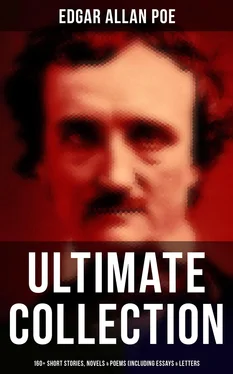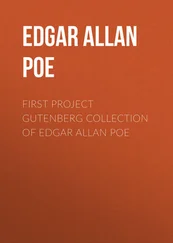I made the attempt in vain.
“We are possibly not giving this matter a fair trial,” he said. “The paper is spread out upon a plane surface; but the human throat is cylindrical. Here is a billet of wood, the circumference of which is about that of the throat. Wrap the drawing around it, and try the experiment again.”
I did so; but the difficulty was even more obvious than before.
“This,” I said, “is the mark of no human hand.”
“Read now,” replied Dupin, “this passage from Cuvier.” It was a minute anatomical and generally descriptive account of the large fulvous Ourang-Outang of the East Indian Islands. The gigantic stature, the prodigious strength and activity, the wild ferocity, and the imitative propensities of these mammalia are sufficiently well known to all. I understood the full horrors of the murder at once.
“The description of the digits,” said I, as I made an end of reading, “is in exact accordance with this drawing, I see that no animal but an Ourang-Outang, of the species here mentioned, could have impressed the indentations as you have traced them. This tuft of tawny hair, too, is identical in character with that of the beast of Cuvier. But I cannot possibly comprehend the particulars of this frightful mystery. Besides, there were two voices heard in contention, and one of them was unquestionably the voice of a Frenchman.”
True; and you will remember an expression attributed almost unanimously, by the evidence, to this voice — the expression, ‘mon Dieu!’ This, under the circumstances, has been justly characterized by one of the witnesses (Montani, the confectioner,) as an expression of remonstrance or expostulation. Upon these two words, therefore, I have mainly built my hopes of a full solution of the riddle. A Frenchman was cognizant of the murder. It is possible — indeed it is far more than probable — that he was innocent of all participation in the bloody transactions which took place. The Ourang-Outang may have escaped from him. He may have traced it to the chamber; but, under the agitating circumstances which ensued, he could never have re-captured it. It is still at large. I will not pursue these guesses-for I have no right to call them more — since the shades of reflection upon which they are based are scarcely of sufficient depth to be appreciable by my own intellect, and since I could not pretend to make them intelligible to the understanding of another. We will call them guesses then, and speak of them as such. If the Frenchman in question is indeed, as I suppose, innocent of this atrocity, this advertisement, which I left last night, upon our return home, at the office of ‘Le Monde,’ (a paper devoted to the shipping interest, and much sought by sailors,) will bring him to our residence.”
He handed me a paper, and I read thus: Caught — In the Bois de Boulogne, early in the morning of the — inst., (the morning of the murder,) a very large, tawny Ourang-Outang of the Bornese species. The owner, (who is ascertained to be a sailor, belonging to a Maltese vessel,) may have the animal again, upon identifying it satisfactorily, and paying a few charges arising from its capture and keeping. Call at No. — Rue — Faubourg St. Germain — au troisieme.
“How was it possible,” I asked, “that you should know the man to be a sailor, and belonging to a Maltese vessel?”
“I do not know it,” said Dupin. “I am not sure of it. Here, however, is a small piece of ribbon, which from its form, and from its greasy appearance, has evidently been used in tying the hair in one of those long queues of which sailors are so fond. Moreover, this knot is one which few besides sailors can tie, and is peculiar to the Maltese. I picked the ribbon up at the foot of the lightning-rod. It could not have belonged to either of the deceased. Now if, after all, I am wrong in my induction from this ribbon, that the Frenchman was a sailor belonging to a Maltese vessel, still I can have done no harm in saying what I did in the advertisement. If I am in error, he will merely suppose that I have been misled by some circumstance into which he will not take the trouble to inquire. But if I am right, a great point is gained. Cognizant although innocent of the murder, the Frenchman will naturally hesitate about replying to the advertisement — about demanding the Ourang-Outang. He will reason thus:—‘I am innocent; I am poor; my Ourang-Outang is of great value — to one in my circumstances a fortune of itself — why should I lose it through idle apprehensions of danger? Here it is, within my grasp. It was found in the Bois de Boulogne — at a vast distance from the scene of that butchery. How can it ever be suspected that a brute beast should have done the deed? The police are at fault — they have failed to procure the slightest clew. Should they even trace the animal, it would be impossible to prove me cognizant of the murder, or to implicate me in guilt on account of that cognizance. Above all, I am known. The advertiser designates me as the possessor of the beast. I am not sure to what limit his knowledge may extend. Should I avoid claiming a property of so great value, which it is known that I possess, I will render the animal, at least, liable to suspicion. It is not my policy to attract attention either to myself or to the beast. I will answer the advertisement, get the Ourang-Outang, and keep it close until this matter has blown over.
At this moment we heard a step upon the stairs.
“Be ready,” said Dupin, “with your pistols, but neither use them nor show them until at a signal from myself.”
The front door of the house had been left open, and the visitor had entered, without ringing, and advanced several steps upon the staircase. Now, however, he seemed to hesitate. Presently we heard him descending. Dupin was moving quickly to the door, when we again heard him coming up. He did not turn back a second time, but stepped up with decision and rapped at the door of our chamber.
“Come in,” said Dupin, in a cheerful and hearty tone.
A man entered. He was a sailor, evidently — a tall, stout, and muscular-looking person, with a certain dare-devil expression of countenance, not altogether unprepossessing. His face, greatly sunburnt, was more than half hidden by whisker and mustachio. He had with him a huge oaken cudgel, but appeared to be otherwise unarmed. He bowed awkwardly, and bade us “good evening,” in French accents, which, although somewhat Neufchatelish, were still sufficiently indicative of a Parisian origin.
Sit down, my friend,” said Dupin. “I suppose you have called about the Ourang-Outang. Upon my word, I almost envy you the possession of him; a remarkably fine, and no doubt a very valuable animal. How old do you suppose him to be?”
The sailor drew a long breath, with the air of a man relieved of some intolerable burden, and then replied, in an assured tone:
“I have no way of telling — but he can’t be more than four or five years old. Have you got him here?”
“Oh no; we had no conveniences for keeping him here. He is at a livery stable in the Rue Dubourg, just by. You can get him in the morning. Of course you are prepared to identify the property?”
“To be sure I am, sir.”
“I shall be sorry to part with him,” said Dupin.
“I don’t mean that you should be at all this trouble for nothing, sir,” said the man. “Couldn’t expect it. Am very willing to pay a reward for the finding of the animal — that is to say, any thing in reason.”
“Well,” replied my friend, “that is all very fair, to be sure. Let me think! — what should I have? Oh! I will tell you. My reward shall be this. You shall give me all the information in your power about these murders in the Rue Morgue.”
Dupin said the last words in a very low tone, and very quietly. Just as quietly, too, he walked toward the door, locked it, and put the key in his pocket. He then drew a pistol from his bosom and placed it, without the least flurry, upon the table.
Читать дальше












